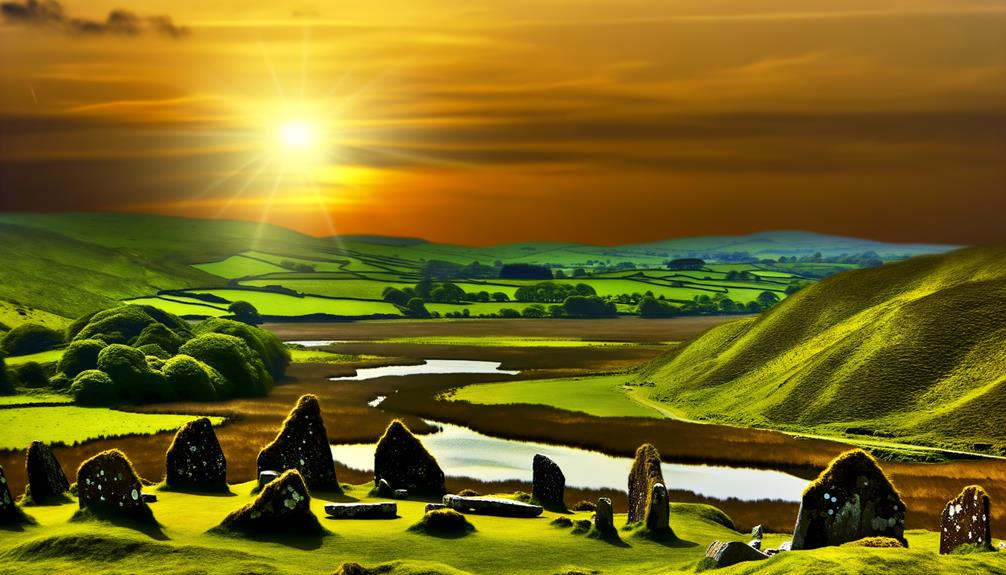Erin Name Meaning and Origin
Erin is a name deeply rooted in Gaelic heritage, originating from the Old Irish word 'Éirinn,' which means Ireland. Its historical evolution can be traced back to Proto-Celtic languages, symbolizing the picturesque landscapes and resilient spirit of Ireland.
Often associated with beauty, strength, and simplicity, Erin carries significant cultural and literary importance. Its phonetic charm and ease of pronunciation have helped it gain global popularity, particularly in English-speaking countries.
Variations and nicknames such as Eri, Rin, and Rinnie further extend its appeal. For a more thorough understanding of this name's remarkable journey, stay tuned.

Key Takeaways
- Erin originates from the Gaelic word 'Éirinn,' representing the island of Ireland.
- The name symbolizes beauty, strength, resilience, and Irish heritage.
- Erin's global popularity increased in English-speaking countries in the late 20th century.
- Common nicknames include Eri, Rin, Er, and Rinnie.
- Variations of Erin exist in Irish, Welsh, French, and Greek, showing linguistic adaptability.
Historical Roots
The historical roots of the name Erin can be traced back to ancient Ireland, where it originates from the Gaelic word 'Éirinn,' a poetic name for the island. This term itself is derived from 'Éire,' the modern Irish name for Ireland.
Historical texts, including mythological and early medieval literature, frequently reference Éirinn, highlighting its cultural and national significance. The name Erin has been employed in various artistic and literary contexts, symbolizing the land and its heritage.
Over centuries, Erin transcended its original use, becoming a common given name, particularly in English-speaking countries. Its enduring popularity reflects a deep-seated connection to Irish identity and history, reinforced by linguistic evolution and cultural preservation.
Gaelic Origins
Rooted in the Gaelic language, the name Erin derives from the ancient term 'Éirinn,' which holds significant historical and linguistic importance.
Éirinn is the dative case of Éire, the modern Irish word for Ireland. This term can be traced back to Old Irish and is ultimately derived from the Proto-Celtic *Φīwerjū.
Historically, Éirinn was used in early Gaelic literature and poetry, symbolizing not just the land but also its cultural heritage and identity.
The linguistic evolution of Éirinn into Erin reflects the Anglicization processes that occurred over centuries, making the name accessible beyond Gaelic-speaking regions while preserving its deep-rooted cultural essence.
This transformation underscores the enduring connection between language and identity.
Meaning of Erin
The name Erin, rooted in the ancient Gaelic word 'Éirinn,' is historically associated with Ireland itself, denoting a deep connection to the land and its heritage.
Modern interpretations have broadened the name's appeal, highlighting its simplicity and elegance in various cultural contexts.
Erin's cultural significance is further enriched by its prevalence in literature, folklore, and contemporary naming trends, reflecting a timeless resonance across generations.
Historical Name Roots
Tracing back to ancient Gaelic origins, Erin is derived from the Irish word 'Éirinn,' which is the dative case of 'Éire,' the Irish name for Ireland. This etymology roots Erin deeply in the cultural and historical fabric of Ireland, symbolizing the land itself. Historically, names were often derived from places or significant geographical landmarks, and Erin is no exception. Its usage in literature and poetry has further cemented its association with Ireland.
| Aspect | Details |
|---|---|
| Origin | Gaelic |
| Derived From | Éirinn (dative of Éire) |
| Meaning | Ireland |
| Usage | Historical, Literary |
| Symbolism | Cultural and Geographical |
This table underscores Erin's rich historical and linguistic heritage, reflecting its enduring significance.
Modern Interpretations
Building on its historical and cultural foundations, the modern interpretation of the name Erin extends beyond its geographical origin to encompass qualities of beauty, strength, and resilience.
Initially derived from the Gaelic word 'Éirinn,' representing Ireland, Erin has evolved in contemporary usage. In modern contexts, the name is often associated with individuals who possess an intrinsic elegance and fortitude.
Linguistically, the simplicity and phonetic appeal of Erin make it a favored choice in English-speaking countries. Moreover, the name's adaptability and timeless charm contribute to its enduring popularity.
Its succinct, two-syllable structure allows for easy integration into various cultural settings, reinforcing its universal appeal while retaining a sense of historical richness.
Cultural Significance
Rooted in its Gaelic origins, the name Erin carries significant cultural weight, symbolizing a deep connection to Irish heritage and identity.
Historically, 'Erin' is derived from the Irish word 'Éirinn,' a poetic name for Ireland itself. This derivation imbues the name with a sense of national pride and cultural reverence, often associated with Irish folklore, literature, and music.
Linguistically, 'Erin' encapsulates the essence of the Irish landscape and spirit, evoking imagery of verdant fields and storied pasts.
In contemporary contexts, the name retains its cultural resonance, serving as a reminder of Ireland's rich history and enduring legacy. Consequently, Erin remains a popular name choice for those wishing to honor their Irish roots.
Erin in Literature
The name Erin has appeared in various literary works, often symbolizing themes of nature, tradition, and Irish heritage.
In 19th-century Irish poetry, Erin frequently represents the personification of Ireland, evoking a sense of national pride and cultural identity. Literary figures like Thomas Moore have used Erin in their works to emphasize the lush landscapes and storied past of Ireland.
The linguistic origin of Erin, derived from the Gaelic 'Éirinn,' contributes to its strong cultural resonance. In modern literature, the name continues to be a poignant reminder of Ireland's rich history and natural beauty. Authors employ Erin not only as a character name but also as an emblematic reference to evoke the essence of Irish tradition and mythology.
Global Popularity
Erin has gained considerable global popularity, transcending its Irish roots to become a widely recognized and cherished name across various cultures.
Historically, the name Erin is derived from the Irish word 'Éirinn,' meaning 'Ireland.' Its phonetic simplicity and melodic quality have contributed to its appeal, facilitating its adoption beyond the Irish community.
Linguistically, Erin's two-syllable structure makes it easy to pronounce and remember, enhancing its cross-cultural resonance.
In the late 20th century, the name saw a significant rise in usage, particularly in English-speaking countries such as the United States, Canada, and Australia. This widespread acceptance underscores Erin’s evolution from a regional name to a global phenomenon, reflecting broader trends in cultural exchange and linguistic adaptation. As this name gained prominence, many sought to understand its roots and significance, leading to discussions about its association with various cultures and histories. Additionally, resources emerged to detail different name origins, including the allison name origin explained. This exploration not only satisfied the curiosity of parents naming their children but also highlighted the interconnectedness of names across cultures, further enriching the narrative of personal identity.
Famous People Named Erin
Prominent individuals named Erin have made significant contributions across various fields, highlighting the name's widespread appeal and cultural impact. Historically, the name Erin has been embraced by a diverse range of professionals, each leaving an indelible mark on their respective industries. Notable examples include:
- Erin Brockovich: An environmental activist whose legal case against Pacific Gas and Electric Company inspired a major motion picture.
- Erin Andrews: A well-known sports broadcaster and television personality, recognized for her work with ESPN and Fox Sports.
- Erin Morgenstern: Author of the highly acclaimed novel 'The Night Circus,' which has captured readers worldwide.
- Erin O'Connor: A prominent British model, celebrated for her contributions to the fashion industry and modeling.
These individuals underscore the versatility and cultural resonance of the name Erin.
Variations and Nicknames
Variations and nicknames of the name Erin offer insights into its cultural adaptability and linguistic transformations.
Common nicknames such as 'Er' and 'Rin' reflect a casual, affectionate approach to the name.
Internationally, variations like the Irish 'Eireann' or the Welsh 'Erinwen' highlight the name's regional adaptations and historical roots in Celtic languages.
Common Erin Nicknames
Over the years, several nicknames and variations for the name Erin have emerged, reflecting both cultural influences and linguistic adaptations. These diminutives and affectionate forms provide insight into the versatility and personal touch people bring to this classic name.
Common nicknames include:
- Eri – A simple, affectionate shortening that retains the name's essence.
- Rin – A concise variation often used for its modern and trendy appeal.
- Er – A minimalistic option that conveys familiarity and intimacy.
- Rinnie – A more playful and endearing form, often favored in close-knit circles.
These nicknames, while varied, all serve to maintain the core identity of Erin, demonstrating the name's adaptability across different social and linguistic contexts.
International Erin Variations
Across different cultures and languages, the name Erin has evolved into numerous variations, each reflecting unique phonetic and cultural nuances.
In Ireland, its origin, Erin is derived from the Irish word 'Éirinn,' which means 'of Ireland.'
In Welsh, it transforms to 'Eirian,' signifying 'bright' or 'beautiful.'
The French adapt it as 'Irène,' while in Greek, it becomes 'Eirini,' both meaning 'peace.'
Each variation showcases the linguistic adaptability of the name, adapting to phonological systems and cultural contexts.
These international iterations demonstrate how the name Erin maintains its core identity while embracing the distinctive sounds and meanings of different languages.
This linguistic flexibility underscores the name's enduring appeal and widespread resonance across diverse cultures.
Conclusion
The name Erin, rooted in Gaelic origins, signifies 'peace' and 'Ireland.' Its historical and linguistic journey highlights its cultural significance, appearing prominently in literature and maintaining global popularity.
Variations and nicknames further enrich its use. The persistence of Erin in various contexts underscores its timeless appeal.
Given its deep-seated historical and cultural foundations, the name Erin embodies a rich tapestry of meaning that continues to resonate across generations and geographies.






